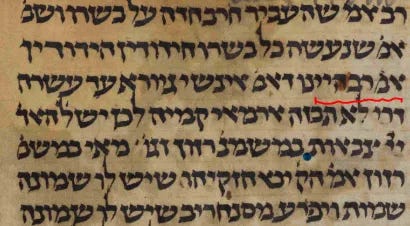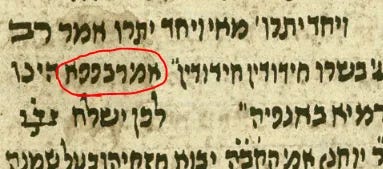Rav Pappa Explains the Goosebumps
On Sanhedrin 94a, we have the following dispute between Rav and Shmuel about Yisro’s joy.
״וַיִּחַדְּ יִתְרוֹ״ – רַב וּשְׁמוּאֵל. רַב אָמַר: שֶׁהֶעֱבִיר חֶרֶב חַדָּה עַל בְּשָׂרוֹ, וּשְׁמוּאֵל אָמַר: שֶׁנַּעֲשָׂה חִדּוּדִים חִדּוּדִים כׇּל בְּשָׂרוֹ.
It is written in the previous verse: “Vayyiḥad Yitro for all the goodness that the Lord had done to Israel, whom He had delivered out of the hand of Egypt” (Exodus 18:9). Rav and Shmuel disagreed with regard to the meaning of vayyiḥad. Rav says: He passed a sharp [ḥad] sword over his flesh, i.e., he circumcised himself and converted. And Shmuel says: He felt as though cuts [ḥiddudim] were made over his flesh, i.e., he had an unpleasant feeling due to the downfall of Egypt.
I already discussed this midrashic dispute on this substack:
Yitro's Multivalent Joy
I’ve written many posts on Yitro. Indeed, there is a roundup on parshablog of about 48 such posts, until 2013. Since then, in 2014, I wrote about:
and that was partly a follow-up of a post about Rashbam’s analysis of the word vayichad, and Eliyahu Munk’s accidental mistranslation of it.
Yitro: Rashbam and the Dagesh in וַיִּ֣חַדְּ
I’ve been kvetching a lot about Eliyahu Munk’s commentary, and the censorship therein. One point I try to make is that we should take care not to hastily attribute nefarious motives to mistranslations. These might be mere mistranslations because of the difficult task of translating, not because our English translator is trying to hide stuff from us. (Ye…
What was grammatically weird about the word vayichad was perhaps the spark for the Rav / Shmuel dispute, where they take the final dagesh kal together with the leading parach as if it is a dagesh chazak.
OK, enough background. Now, on to the content of this post. The gemara continues:
אָמַר רַב: הַיְינוּ דְּאָמְרִי אִינָשֵׁי, גִּיּוֹרָא עַד עַשְׂרָה דָּרֵי לָא תִּבְזֵה אַרְמַאי קַמֵּיהּ.
Rav says with regard to this statement of Shmuel that this is in accordance with the adage that people say: With regard to a convert, for ten generations after his conversion one should not disparage a gentile before him and his descendants, as they continue to identify somewhat with gentiles and remain sensitive to their pain.
It seems strange for Rav to comment on / support Shmuel’s interpretation of vayichad. Sometimes Amoraim do this, e.g. Rava showing how to read a Tannaitic source in accordance with his disputant, Abaye, but it still is somewhat strange.
Masoret HaShas says, based on Yalkut (Shimoni?) that we should change this “Rav” to Rav Pappa.
I would add this if we search for the phrase הַיְינוּ דְּאָמְרִי אִינָשֵׁי, which invokes common sayings, several Amoraim use the expression. However, a whole bunch of such invocations (about 17) are by Rav Pappa, more than half of which (10 of the 17) occur in Sanhedrin. So, this seems like a good fix, and would shift it to 11/18 instances occurring in Sanhedrin.
So, looking at variants, it is the printings that lost the Pappa from Rav Pappa, while manuscripts mostly have it.
The printings, without Pappa:
The manuscripts, all with Pappa:
as well as this fragment:
and finally, the fragment (really, a full page) which lacks Pappa, Wien, N: Fragm. Hebr. A 44:








